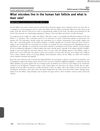 4 citations,
April 2021 in “Experimental Dermatology”
4 citations,
April 2021 in “Experimental Dermatology” Antibiotics might affect hair growth by changing the bacteria in hair follicles.
 73 citations,
April 2019 in “Experimental Dermatology”
73 citations,
April 2019 in “Experimental Dermatology” The scalp's microorganisms significantly affect hair health and disease.
[object Object]  26 citations,
May 2019 in “PLOS ONE”
26 citations,
May 2019 in “PLOS ONE” Hair loss patients have different microbes in hair follicles, possibly affecting hair loss.
4 citations,
March 2022 in “BioEssays” Hydra can help understand human hair follicle microbiomes and develop new skin disease therapies.
 May 2021 in “British Journal of Dermatology”
May 2021 in “British Journal of Dermatology” Different tiny organisms live in human hair follicles and can affect both health and skin conditions, including acne and hair loss.
 4 citations,
October 2022 in “Genes”
4 citations,
October 2022 in “Genes” Our microbiome may affect the development of the hair loss condition Alopecia Areata, but more research is needed to understand this relationship.

Changes in gut and skin bacteria are linked to different hair loss conditions, and treatments like fecal transplants and probiotics might help, but more research is needed.
 April 2024 in “Frontiers in cellular and infection microbiology”
April 2024 in “Frontiers in cellular and infection microbiology” Blue light might help treat skin conditions by affecting the skin's bacteria.
April 2019 in “Journal of Investigative Dermatology” Alopecia Areata patients have too many Firmicutes and too few Bacteroides in their gut.
 10 citations,
June 2017 in “Experimental Dermatology”
10 citations,
June 2017 in “Experimental Dermatology” New hair loss treatments have evolved from understanding hair biology and patient needs.
[object Object] 
Changes in skin bacteria can affect hair loss and new treatments targeting these bacteria may prevent balding without sexual side effects.
1 citations,
November 2023 in “Biomedicines” Menopause can cause hair thinning and texture changes due to hormonal and metabolic shifts.
 March 2021 in “Actas Dermo-Sifiliográficas”
March 2021 in “Actas Dermo-Sifiliográficas” The microbiome may be linked to hair loss and could be a target for new treatments.
 April 2024 in “Skin appendage disorders”
April 2024 in “Skin appendage disorders” Environmental pollutants can damage hair health and cause hair loss.
 3 citations,
January 2021 in “Actas Dermo-Sifiliográficas”
3 citations,
January 2021 in “Actas Dermo-Sifiliográficas” The document concludes that changing the scalp's microbiome might be a new way to treat hair loss.
 2 citations,
November 2023 in “Frontiers in microbiology”
2 citations,
November 2023 in “Frontiers in microbiology” The health of the gut may be important in developing new ways to prevent, diagnose, and treat alopecia areata.
Different genes and pathways are active in yak skin and hair cells, affecting hair growth and immune responses.
 June 2022 in “bioRxiv (Cold Spring Harbor Laboratory)”
June 2022 in “bioRxiv (Cold Spring Harbor Laboratory)” ILC1-like cells can cause alopecia areata by attacking hair follicles.
 1 citations,
July 2023 in “Scientific Reports”
1 citations,
July 2023 in “Scientific Reports” Wearing a hijab changes the common bacteria and fungi on the scalp, possibly affecting skin health.
10 citations,
July 1994 in “Journal of Dermatological Science” Cyclosporin extends hair growth in mice, but high-dose corticosteroids block this effect.
 7 citations,
November 2020 in “Experimental Dermatology”
7 citations,
November 2020 in “Experimental Dermatology” Different cell types work together to repair skin, and targeting them may improve healing and reduce scarring.
 5 citations,
October 2022 in “Phenomics”
5 citations,
October 2022 in “Phenomics” Your skin is like an ecosystem, with its own community of microbes and substances that interact and affect its health.
 3 citations,
June 2023 in “Medicines”
3 citations,
June 2023 in “Medicines” Some antiseizure medications can cause reversible hair loss, with valproate, lamotrigine, and carbamazepine being the most common.
April 2024 in “Journal of clinical medicine research” Seborrheic alopecia in young people is linked to fungal infections, especially Malassezia.
Protein profiling of forehead skin can help distinguish between frontal fibrosing alopecia and androgenetic alopecia.
14 citations,
September 2021 in “International journal of molecular sciences” Zinc pyrithione needs targeted delivery to the scalp for effective dandruff treatment.
 November 2022 in “Journal of Investigative Dermatology”
November 2022 in “Journal of Investigative Dermatology” Butyrate helps hair grow longer, improves hair cell health, increases pigment production, and boosts hair's natural defenses.
July 2022 in “Journal of Investigative Dermatology” Skin bacteria help hair regrow by boosting cell metabolism.
1 citations,
January 2023 in “Science Advances” The skin's microbiome helps hair regrow by boosting certain cell signals and metabolism.
3 citations,
August 2022 in “Molecules/Molecules online/Molecules annual” A new strain of bacteria from the human skin can help prevent hair loss.



















